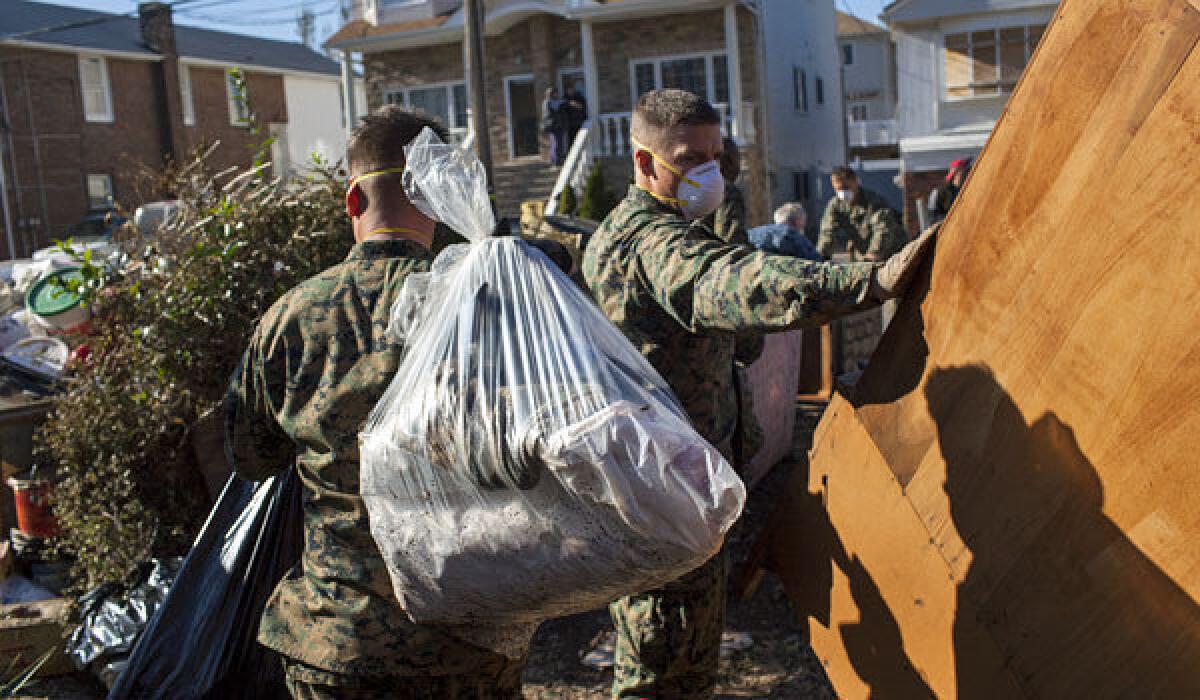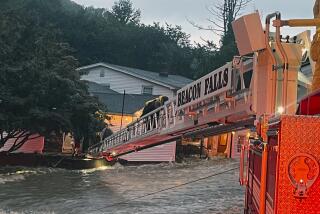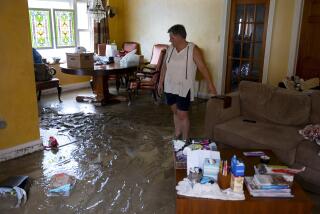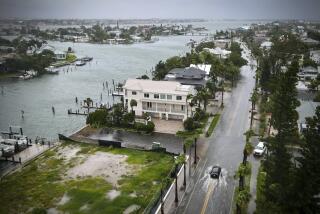Second storm to hit Sandy-damaged Northeast; evacuations ordered

Residents in New York and New Jersey on Wednesday braced for the arrival of a nor’easter expected to pelt the region with more rain, high winds and coastal flooding even as the Superstorm Sandy recovery is underway.
The storm, carrying gusts of 60 mph, was moving north and east over the mid-Atlantic, according to the National Weather Service. Coastal flooding advisories were posted for parts of New Jersey along with high-wind warnings for parts of New York and Long Island.
“A low-pressure system off the mid-Atlantic coast will continue to strengthen as it moves north on Wednesday, bringing rain, snow, and/or a mixture of precipitation to areas across the northern mid-Atlantic and Northeast, as well as wind gusts as high as 60 mph along the coast,” the Weather Service warned. “Snowfall across interior sections of New England could approach 6-12 inches. Coastal flooding is also possible.”
It was scant comfort that the latest storm was far less severe than Sandy, which came ashore with hurricane-force winds on Oct. 29. The region is still recovering from Sandy’s battering and tidal surge that flooded homes and tunnels and brought New York’s vaunted transportation system to a halt.
The new storm threatens to delay or even undo some of the repairs in the aftermath of Sandy.
FULL COVERAGE: East Coast hit by deadly storm
“The new weather system approaching the region on Wednesday will bring rain and heavy winds that could slam trees into power lines,” Con Ed warned. “The new storm could delay Con Edison’s customer restorations. Crews repairing overhead lines and equipment cannot work in high winds.”
As of midnight, Con Edison said it had restored power to more than 90% of the customers affected by the hurricane, with approximately 79,000 customers without electricity out of about 980,000 affected. The utility said customers out of power include approximately 400 in Manhattan, 13,000 in Queens, 15,000 in Brooklyn, 3,300 on Staten Island and 4,500 in the Bronx. In Westchester County, just north of the Bronx, the company reported approximately 41,000 customers out of service.
INTERACTIVE: Before and after Sandy
About 20,000 customers in low-lying areas, including parts of Brooklyn and Queens, remain without power until a licensed electrician can verify that the local systems are safe to turn back on, the utility said.
Nationally, about 930,000 electricity customers remained without power in the states hit by Sandy, according to the federal Department of Energy. Most of those people are in New Jersey, where winds had begun to strengthen as of Wednesday morning.
Evacuations were spotty, but officials were watching the incoming afternoon tides. Storm surges were expected to reach perhaps 3 feet—far below the record 14 feet reported in New York City during Sandy. However, the earlier storm stripped away natural defenses, so more beach erosion was expected.
At least 34,000 were receiving some form of emergency federal housing assistance in New York, New Jersey and Connecticut, according to federal officials, but another 60,000 were eligible for some form of aid. More than 277,000 people have registered for federal help, the Federal Emergency Management Agency said.
Many of those people had sustained losses from the floods and had fled to higher ground, including shelters and hotels. On Wednesday, officials urged them to stay away a bit longer because of the new storm.
New York Mayor Michael Bloomberg ordered police to use their patrol car loudspeakers to warn vulnerable residents about evacuating. “No general evacuations have been ordered, but if you experienced significant flooding during Hurricane Sandy, you should consider taking shelter with family and friends, who do not live in low-lying areas, or go to one of the City-run storm shelters,” the city posted on its website.
“Even though it’s not anywhere near as strong as Sandy — nor strong enough, in normal times, for us to evacuate anybody — out of precaution and because of the changing physical circumstances, we are going to go to some small areas and ask those people to go to higher ground,” Bloomberg said.
The city closed all parks, playgrounds and beaches, as well as ordered all construction sites to be secured. On Tuesday evening, the mayor ordered three nursing homes and an adult care facility evacuated from Queens’ vulnerable Rockaway Peninsula because of fears the weather might knock out electricity already being provided by generators. About 620 residents were moved.
Atlantic County, in the southern part of New Jersey, activated its emergency operations center and told residents to restock their emergency supplies.
Major airlines announced they were shutting down some operations because of the new storm. United suspended most New York City service starting at noon while American Airlines was shutting down in New York at 3 p.m. Wednesday.
Gasoline was again being pumped, but perhaps 25% of stations in New York City were still closed as were about 35% in New Jersey, according to the AAA.
ALSO:
East Coast awaits another wet and windy storm
One patient found dead in North Carolina hospital fire
Bales said, ‘You guys are going to thank me,’ soldiers testify
More to Read
Sign up for Essential California
The most important California stories and recommendations in your inbox every morning.
You may occasionally receive promotional content from the Los Angeles Times.











